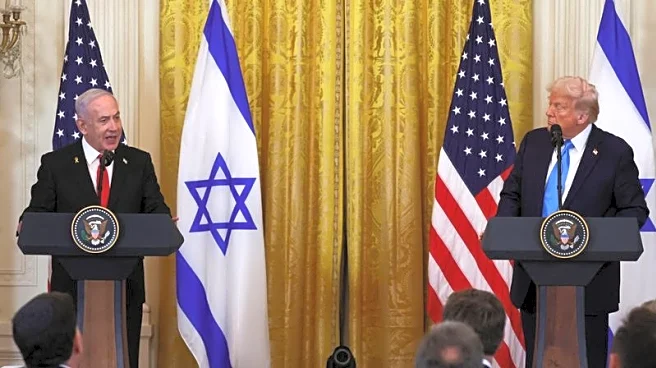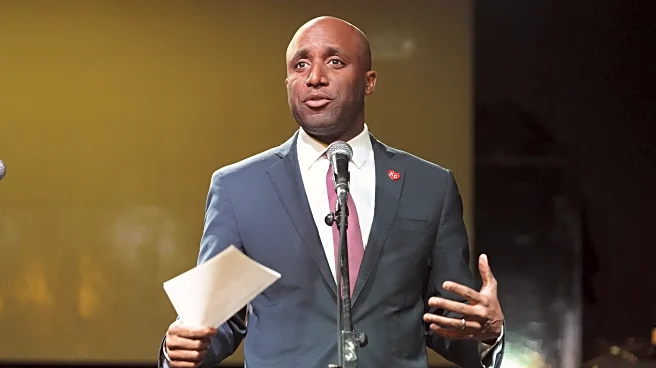By Gram Slattery, Steve Holland and Matt Spetalnick
WASHINGTON (Reuters) -Less than four months ago, President Donald Trump met with the leader of Qatar, praising his opulent palace and signing a sweeping
defense agreement with the Gulf monarchy, a key ally that hosts the biggest U.S. base in the Middle East.
Israel's surprise attack on Tuesday against Hamas leaders in Doha has jolted that relationship, angering Trump and drawing fierce condemnation from Doha and Western allies.
Ordered by Israeli Prime Minister Benjamin Netanyahu and targeting the political offices of the Palestinian militant group, the strikes killed a Qatari security agent and five others, but failed to kill the Hamas leaders. Trump said he was "very unhappy about every aspect" of the Israeli operation.
But for all the indignation, the strikes are unlikely to change the president's fundamental approach toward Israel, analysts and U.S. officials say. If anything, the bombings underlined the cold calculus beneath the Trump-Netanyahu relationship.
Israel has shown it is not afraid to act against U.S. interests. The administration of Prime Minister Benjamin Netanyahu did not formally warn Washington of its impending bombing campaign on Tuesday, U.S. officials said.
That lack of warning recalled Israel's September 2024 attack on Hezbollah, when Israel wounded thousands of the militant group's members with booby-trapped pagers, without informing then-President Joe Biden.
Trump, for his part, has occasionally expressed displeasure with Netanyahu. But his administration has strongly supported Israel's campaign to weaken Hamas and allowed it to largely take the lead on key issues such as Iran's nuclear program.
"On this one, I think Trump is annoyed by Netanyahu's tactics," said Aaron David Miller, a senior fellow at the Carnegie Endowment for International Peace and veteran U.S. peace negotiator.
But, Miller added, "(Trump's) instinct is that he agrees with Netanyahu's notion that Hamas cannot just be hollowed out as a military organization. It needs to be fundamentally weakened."
Asked for comment, the White House referred Reuters to remarks by Trump on Truth Social on Tuesday night, during which he said the bombings did not advance U.S. or Israeli interests.
"However," Trump wrote, "eliminating Hamas, who have profited off the misery of those living in Gaza, is a worthy goal."
The Israeli Embassy in Washington did not respond to a request for comment.
NO RUPTURE LIKELY
Some analysts declined to rule out the possibility that Netanyahu may yet exhaust Trump's patience if he springs more surprises on Washington. In practice, that could mean a withdrawal of political cover for Israel's ongoing invasion of Gaza, which has provoked outrage among European and Arab nations as famine conditions spread.
Israel's military campaign in the Palestinian enclave was triggered by a Hamas-led rampage in southern Israel on Oct. 7, 2023.
"As his Arab friends complain to him about what Israel is doing - and they are doing so now - he may say to them give me a credible plan for the day after in Gaza and with an alternative to Hamas running it and I will tell Bibi you have done enough,” said Dennis Ross, a former Middle East negotiator for Democratic and Republican administrations.
Israel's strike in Doha will likely dampen Trump's hopes for more Gulf states joining the Abraham Accords, a landmark agreement brokered by his first administration in which several Arab countries forged diplomatic ties with Israel.
Still, a rupture between the two men seems unlikely, argued Michael Oren, Israel's former ambassador to the United States, saying that Trump appreciates strength and transactions that end wars.
"If Netanyahu can continue to appeal to those two sides of this president then he will be okay. I'm not concerned about the relationship," said Oren.
HOT AND COLD
The Trump-Netanyahu partnership has seen ups and downs, administration officials acknowledge.
"It's been hot and cold since the campaign," said one senior White House official.
In May, Trump traveled to Saudi Arabia, Qatar and the United Arab Emirates during his first major foreign trip, skipping Israel, which many analysts viewed as a snub. The Republican president returned to office in January promising to reinvigorate relations with Netanyahu that had deteriorated under his Democratic predecessor.
During that trip, Trump agreed to lift sanctions on the new Syrian government at the behest of Saudi Crown Prince Mohammed bin Salman. That move alarmed Israeli officials who question the motives of Syrian President Ahmed al-Sharaa, a former al-Qaeda commander.
But just a month later, the Trump-Netanyahu alliance seemed back on track. After Israel launched an air war on Iran in June, Trump - who campaigned on ending foreign conflicts - surprised even some of his own political allies by sending B-2 bombers to partially destroy Iran's key nuclear facilities.
If that created goodwill within the Netanyahu administration, it did not benefit Trump's foreign policy interests, at least in the short-term.
Days later, Trump profanely chastised Iran and Israel for breaking a U.S.-brokered ceasefire. In July, the U.S. appeared to criticize an Israeli strike in Damascus, which destroyed part of Syria's defense ministry. And on Tuesday, Israel notified the U.S. shortly before the Qatar strike, but there was no coordination with or approval from Washington, two U.S. officials said.
"The U.S. can seek to cajole and push Israel to take decisions," said Jonathan Panikoff, a former deputy U.S. national intelligence officer on the Middle East. "But Netanyahu will continue to act in a manner that it views as in the best interests of Israel alone."
(Reporting by Gram Slattery, Steve Holland and Matt Spetalnick; Additional reporting by Jonathan Landay in Washington and Emily Rose in Jerusalem; Editing by Don Durfee and Alistair Bell)










